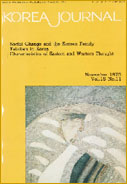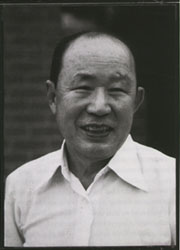Modern Korean Short Stories 1 (of 10 Volumes)
Si-sa-yong-o-sa Publishing
ISBN 0-89209-202-5
This entire series of books does something I find interesting. While each volume is presented as a collection of short stories, it is in fact a kind of hybrid approach between a complete anthology and a collection – each book features two authors, so you get a chance to get a sense of their ouvre. In this case, one author is Kim Dong-ni (whose museum I visited just outside of Gyeongju), and the other (previously unknown to me) is O Yong-su,
The short story Loess Valley could be read as a parable for the crippling effect China has had on Korea, a Chinese general does “assassinate” a local mountain to ensure that no local Hercules can ever threaten China, but mainly it seems to be about two strong, sort of wife-swapping drunken Korean louts. Full of glaring and violence, it is an interesting story to read, but not one that leaves much of a memory.
The Tableau of the Shaman Sorceress is a bit more interesting. A Shaman who lives with her deaf and mute daughter is re-united with her son, now Christian and they fight for religious supremacy, with tragic results. Like Loess Valley it is long on trauma and stabbing. As in most cases with Kim, warfare is to the end.
 The Rock and Two Reservists are short, the first another tragic family story (featuring yet again an attempted murder), and the second about how a sense of family (including both love and loathing, but at least the violence is kept down to a mugging) grows between two reservists, both released from the army.
The Rock and Two Reservists are short, the first another tragic family story (featuring yet again an attempted murder), and the second about how a sense of family (including both love and loathing, but at least the violence is kept down to a mugging) grows between two reservists, both released from the army.
The next two, and last stories by Kim (Cry of the Magpies and Deungshi-bul) , were later released by KLTI and Jimoondang, and I have reviewed them here.
O Yong-su is a bit different from Kim, tending to focus on village-stories, although O’s endings are nearly as unfortunate as Kim’s. The first is Seaside Village, a tale of lost love and the support of a community. Wild Grapes does feature a bit of political content, it is partisans that provide the violence that drives the story, but it is strangely apolitical, comes out of nowhere, recedes back, and makes no general comment. Whereas Kim Tong-ni’s world is permanently bifurcated and at its own throat, even in the worst of times, O’s world is a communal one.
With that said, like Kim’s, O’s world is ![kjloess]](https://www.ktlit.com/wp-content/uploads/2010/03/kjloess.jpg) one of tragedy, as Uncle Soldier reveals. A young boy falls in love with the image of a soldier, who is taken away to the war (again, though the war is an element of the plot, it is not characterized politically). The ending is the inverse of what one might expect. Adolescence is a brief piece of fluff. Nam-I and the Taffyman is a bit more solid, again, the tale of emotion and interaction amongst villagers. The Migratory Bird is O’s only take on pundan munhak and it is surprisingly good. It is short, told from the narrative perspective of one side of a conversation and drinking binge, and its unusual style and brevity work for it in its nearly fable-like story of migratory birds crossing uncrossable borders. The Girl From an Island is a story of 우리나라 (literally, “our nation,” the phrase Koreans routinely use to describe themselves), overflowing with sentimentality and fraternal feelings.
one of tragedy, as Uncle Soldier reveals. A young boy falls in love with the image of a soldier, who is taken away to the war (again, though the war is an element of the plot, it is not characterized politically). The ending is the inverse of what one might expect. Adolescence is a brief piece of fluff. Nam-I and the Taffyman is a bit more solid, again, the tale of emotion and interaction amongst villagers. The Migratory Bird is O’s only take on pundan munhak and it is surprisingly good. It is short, told from the narrative perspective of one side of a conversation and drinking binge, and its unusual style and brevity work for it in its nearly fable-like story of migratory birds crossing uncrossable borders. The Girl From an Island is a story of 우리나라 (literally, “our nation,” the phrase Koreans routinely use to describe themselves), overflowing with sentimentality and fraternal feelings.
The book ends on a grace note, it seems, in the story Echo. This tells the tale of a couple that escapes the confused end of the war and retreats high into the hills, where they make their own life on their own terms. But after so much stabbing, glaring, yelling, drinking, and killing, it is difficult for a reader to process a completely happy ending.
As the dog barks in the background, echoes dying away in the hills, it is too easy to read the echoes and then silence as something insidious. Too much has gone before.
This is a good collection, which can be checked out from the Seoul Cultural Center, about which we will have more to say shortly. Buying it might not be the money move, since it can only be found online, for more that $70.00, used. Luckily, all the stories are available as PDFs at the Korea Journal online.
Stories by Kim
Loess Valley
The Tableau of Shaman Sorceress
The Rock
Two Reservists
Tungsin-bul
The Cry of Magpies
Stories by O
Seaside Village
Wild Grapes
Uncle Soldier
Adolescence
Nami and the Taffyman
The Migratory Bird
The Girl from an Island
The Echo



